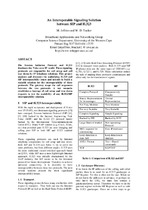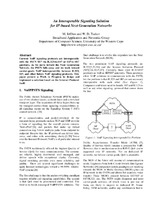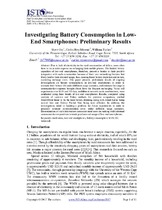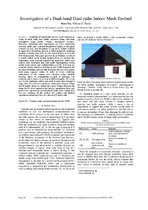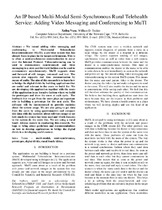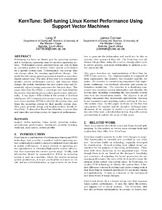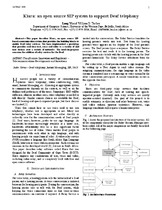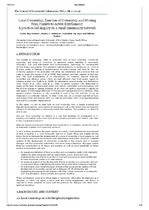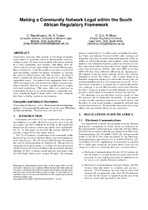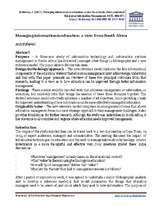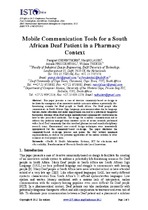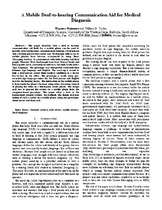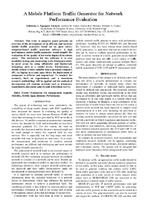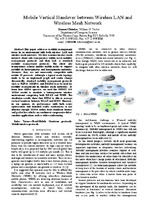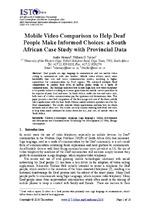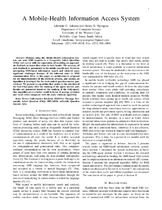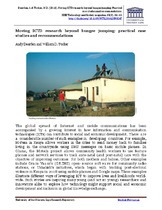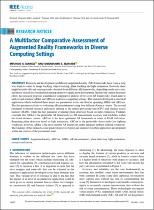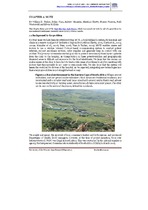Browsing Research Articles (Computer Science) by Title
Now showing items 87-106 of 170
-
An interoperable signaling solution between SIP and H.323
(Telkom, 2001)The Session Initiation Protocol and H.323 dominate the Voice over IP world. These signaling protocols are responsible for call setup and call tear down by IP telephony solutions. This project analyses and discusses the ... -
An Interoperable signaling solution for IP-based Next Generation Networks
(Telkom, 2000)Current VoIP signaling protocols are interoperable with the PSTN SS7 via H.323-to-SS7 or SIP-to-SS7 gateways. As we move toward the Next Generation Network, the PSTN falls away and we work toward carrier-grade VoIP ... -
Investigating battery consumption in low- end smartphones: preliminary results
(International Information Management Corporation, 2017)Due to lack of electricity in the rural communities of Africa, users often have to incur extra expense on recharging their mobile phones. The limited battery capacities of low-end smartphones, therefore, present a barrier ... -
Investigation of a dual-band dual radio indoor mesh testbed
(2018)Scalability of community wireless mesh networks in terms of mesh nodes and mobile end-users along with their anticipated usage profile remains unexplored territory. However, conducting such experiments on a live community ... -
An IP based multimodal semi-synchronous rural telehealth service: Adding video messaging and conferencing to MuTI
(Telkom, 2004)We intend adding video messaging and conferencing to Multimodal Telemedicine Intecommunicator (MuTI), a previous system that has already been in place in the target environment. This is to allow a semi-synchronous communication ... -
KernTune: Self-tuning Linux kernel performance using support vector machines
(Association for Computing Machinery, 2007)Self-tuning has been an elusive goal for operating systems and is becoming a pressing issue for modern operating systems. Well-trained system administrators are able to tune an operating system to achieve better system ... -
Kiara: an open source SIP system to support Deaf telephony
(Telkom, 2008)This paper describes Kiara, an open source SIPbased communication system that provides the building blocks to enable Deaf relay services. We have implemented a prototype that provides real-time text, voice and video to a ... -
Local ownership, exercise of ownership and moving from passive to active entitlement: a practice-led inquiry on a rural community network
(CCIRDT, 2015)In this paper, we aim to shed light on local ownership from a double practical and theoretical perspective, and examine its meaning as well as the factors that are bound to influence its development in community based ... -
Making a community network legal within the South African regulatory framework
(ACM, 2015)Community networks often operate at the fringe of legality with respect to spectrum, network infrastructure and providing services. We have been involved with such a network in a rural community, and together with them, ... -
Managing information in education: a view from South Africa
(Emerald, 2017)PURPOSE – A three-year study of information technology and information systems management in South Africa has delivered (amongst other things) a bibliography and a new reference model. The paper aims to discuss this ... -
Mobile Communication Tools for a South African Deaf patient in a pharmacy context
(IIMC International Information Management Corporation, 2012)This paper presents a case for iterative community-based co-design to facilitate the emergence of an innovative mobile system to address a potentially life-threatening scenario for Deaf people in South Africa. For Deaf ... -
A mobile Deaf-to-hearing communication aid for medical diagnosis
(Telkom, 2010)This paper describes how a deaf to hearing communication aid built for a mobile phone can be used to provide semi-synchronous communication between a Deaf person and a hearing person who cannot sign. Deaf people with access ... -
A mobile platform traffic generator for network performance evaluation
(Telkom, 2013)This work in progress paper presents an overview of the development of an efficient and accurate mobile traffic generator based on an open source computer-based traffic generator software. A high performance mobile traffic ... -
A mobile survey for collecting data from deaf people who use sign language for communication
(Institute of Electrical and Electronics Engineers Inc, 2021)Hearing researchers and practitioners might have encountered challenges in collecting data from Deaf people who mainly rely on sign language for communication. This could be due to language barriers and the non-user-friendly ... -
Mobile vertical handover between infrastructure and ad hoc Wi-Fi networks
(Telkom, 2011)This paper addresses mobility management issues in an environment with both wireless LAN and wireless mesh networks. We first examine wireless mesh network client side transparency within mesh mobility management protocols ... -
Mobile video comparison to help Deaf people make informed choices: a South African case study with provincial data
(IIMC International Information Management Corporation, 2018)Deaf people use sign language to communicate and use mobile video calling to communicate with one another. Mobile video utilises much more bandwidth than text and voice communication modes, resulting in higher expenditure ... -
A Mobile-Health Information Access System
(Telkom, 2013)Patients using the Mobile-Health Information System can send SMS requests to a Frequently Asked Questions (FAQ) web server with the expectation of receiving an appropriate feedback on issues that relate to their health. ... -
Moving ICTD research beyond bungee jumping: practical case studies and recommendations
(Institute of Electrical and Electronics Engineers, 2016)The global spread of Internet and mobile communications has been accompanied by a growing interest in how information and communication technologies (ICTs) can contribute to social and economic development. There are a ... -
A multifactor comparative assessment of augmented reality frameworks in diverse computing settings
(Institute of Electrical and Electronics Engineers, 2023)Research and development on different augmented reality (AR) frameworks have come a long way when it comes to image tracking, object tracking, plane tracking and light estimation. However, there might be trade-offs and ... -
MUTI Telehealth
(2007)For four years we have been iteratively evolving MUTI, a rural telehealth system, for hospitals and clinics in a remote rural part of the Eastern Cape in South Africa (Chetty, 2005; Chetty et al., 2003, 2004a; Maunder et ...

